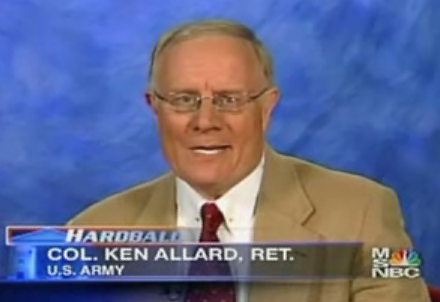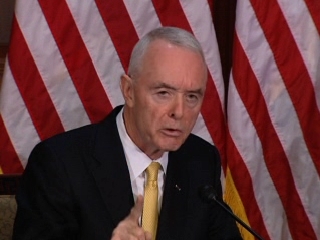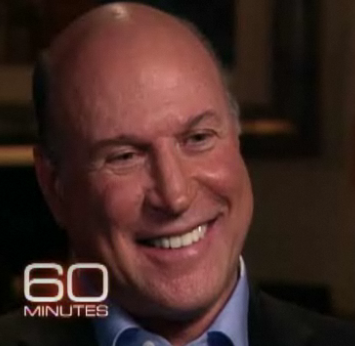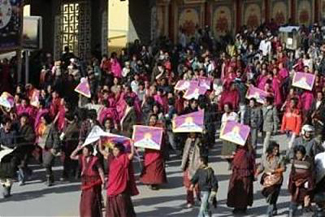The 2008 Falsies Awards: In Memory of the First Casualty
 Part of the coveted AwardsThere's nothing quite like a hotly contested election. The candidates have their devoted supporters and angry detractors. Then there are vigorous debates over the issues, while some people question the integrity of the entire process.
Part of the coveted AwardsThere's nothing quite like a hotly contested election. The candidates have their devoted supporters and angry detractors. Then there are vigorous debates over the issues, while some people question the integrity of the entire process.
We speak, of course, of the Falsies Awards.
This year marks the Center for Media and Democracy's (CMD's) fifth annual Falsies Awards. The Falsies are our attempt to shine an unflattering light on those responsible for polluting the information environment over the past year. We're happy to report that more people -- nearly 1,450 -- voted in this year's Falsies survey than ever before! We're also bestowing special recognition on one of this year's "winners."
Falsies recipients can collect their prizes -- a pair of Groucho Marx glasses, our two cents and a chance to atone for their spinning ways by making a detailed public apology -- by visiting CMD's office in Madison, Wisconsin. This year's Gold and Silver Falsies go to masters of war deception, while the Bronze Falsie recognizes a massive greenwash campaign. The first-ever Lifetime Achievement Falsie goes to a serial corporate front man, while a determined (if at times laughable) attempt at nation re-branding wins dishonorable mention. Then there are the Readers' Choice Falsies and Win Against Spin Awards, nominated by our survey participants.
That's a lot to cover, so without further ado, the winners of the 2008 Falsies Awards are ...
Golden Falsie: The Propaganda Pundits
You could call it General (ret.) Misinformation -- the Pentagon's successful effort to turn retired military officers into the Bush Administration's "message force multipliers," mostly on broadcast and cable television. "You could see that they were messaging," one former Defense Department official explained to New York Times journalist David Barstow, who first reported on the covert program. "You could see they were taking verbatim what the [Defense] secretary was saying ... and they were saying it over and over."
 Pentagon pundit Ken AllardIn the public relations world, putting your words into someone else's mouth is known as the third party technique. When it's secretly carried out with taxpayer funds to influence domestic public opinion, it's illegal propaganda. (Three investigations into the Pentagon pundit program, by the Pentagon's own Inspector General, the Government Accountability Office and the Federal Communications Commission, are still pending.)
Pentagon pundit Ken AllardIn the public relations world, putting your words into someone else's mouth is known as the third party technique. When it's secretly carried out with taxpayer funds to influence domestic public opinion, it's illegal propaganda. (Three investigations into the Pentagon pundit program, by the Pentagon's own Inspector General, the Government Accountability Office and the Federal Communications Commission, are still pending.)
But wait -- there's more! Not only did the 75 Pentagon pundits dutifully parrot Administration talking points on Iraq, Afghanistan, Guantanamo Bay and warrantless wiretapping, in exchange for high-level Pentagon access, special briefings and free trips to those locations. Many of the pundits also had ties to military contractors, via side gigs as industry executives, board members, consultants and/or lobbyists. These private-enterprise pundits used their Pentagon and media access to attract new clients, benefit current clients and enrich themselves.
This "deeply opaque world," where "privileged access to senior government officials" and "war commentary can fit hand in glove with undisclosed commercial interests" is exemplified by one spectacularly conflicted Pentagon pundit, Barry McCaffrey, argued Barstow in his recent follow-up article. McCaffrey heads his own consulting firm and holds lucrative positions with numerous military and security contractors, including Veritas Capital, DynCorp and HNTB Federal Services.
McCaffrey used his Pentagon-funded overseas trips, his access to Defense Department officials and his media appearances on NBC and its cable affiliates to benefit his corporate clients. Yet, neither McCaffrey nor NBC disclosed those clients to viewers. Worse, NBC has yet to report on the Pentagon pundit program. (The same is true of nearly every other implicated network; CNN and NPR are the sole exceptions. PBS, the only other national network that reported on the Pentagon program, did not have paid analysts who participated in it.)
 Barry McCaffreyNBC News anchor Brian Williams has defended McCaffrey as a friend. Evidently he thinks a little propaganda between friends (and their viewers) is no big deal, even though it results in misleading coverage. Several Pentagon pundits have admitted they publicly gave rosy assessments of the war in Iraq while harboring secret doubts, because they were afraid of losing Pentagon access or military contracts.
Barry McCaffreyNBC News anchor Brian Williams has defended McCaffrey as a friend. Evidently he thinks a little propaganda between friends (and their viewers) is no big deal, even though it results in misleading coverage. Several Pentagon pundits have admitted they publicly gave rosy assessments of the war in Iraq while harboring secret doubts, because they were afraid of losing Pentagon access or military contracts.
If NBC and the other networks had disclosed their pundits' conflicts -- or, better yet, featured truly independent commentators, from military and non-military backgrounds -- perhaps the Administration's Iraq war plans would have gone the way of its Social Security privatization deal.
Silver Falsie: Disputing the Count of the Dead
Shortly after the Pentagon pundits' "military-industrial-media complex" helped lead the United States into war, the debate over the cost of the Iraq war began. Nearly six years later, there's still disagreement over whether the final bill will be in the hundreds of billions or trillions of U.S. dollars. More important, of course, is the human cost. We know that more than 4,200 U.S. service members have been killed. But how many Iraqis have lost their lives?
In 2004 and 2006, public health researchers used the best available method in a war zone -- surveying households in randomly distributed clusters -- to answer that question. Both studies were published in the peer-reviewed British medical journal The Lancet. The more recent study estimated that, as of July 2006, there had been more than 650,000 Iraqi "excess deaths," from violent and non-violent causes. War supporters rejected the Lancet studies, questioning the researchers' methods and their motives.
 Wounded Iraqi child (U.S. Army picture)In early 2008 -- more than a year after the later study appeared -- a spate of editorials heaped more scorn on the Lancet studies. These "Swift Boat editorials" (as one of the co-authors of the 2004 Lancet study called them) were based on a January 2008 National Journal article titled "Data Bomb." The article threw several kitchen sinks' worth of accusations at the Lancet studies and their authors: one Iraqi researcher was a Saddam Hussein stooge, the data was questionable, and the political leanings of the researchers and their funders biased their findings. None of the charges hold up under scrutiny.
Wounded Iraqi child (U.S. Army picture)In early 2008 -- more than a year after the later study appeared -- a spate of editorials heaped more scorn on the Lancet studies. These "Swift Boat editorials" (as one of the co-authors of the 2004 Lancet study called them) were based on a January 2008 National Journal article titled "Data Bomb." The article threw several kitchen sinks' worth of accusations at the Lancet studies and their authors: one Iraqi researcher was a Saddam Hussein stooge, the data was questionable, and the political leanings of the researchers and their funders biased their findings. None of the charges hold up under scrutiny.
When another study, authored by the Iraqi Health Ministry and World Health Organization, estimated that 151,000 Iraqis had died since March 2003, the critics of the Lancet studies declared victory. When examined carefully, however, this study's findings are actually similar to those of the 2006 Lancet study. For example, its 151,000 figure is for Iraqi deaths from violent causes only. The study data actually predicts more than 430,000 Iraqi deaths, from both violent and non-violent causes.
While it's not surprising that conservative commentators would seek to defend the Iraq war, mainstream media outlets have often failed to fully and accurately report on Iraqi casualties. For example, in an October 2008 action alert, the media watchdog group Fairness and Accuracy in Reporting challenged the Washington Post's practice of reporting the fewer than 100,000 Iraqi deaths confirmed by media reports as the "maximum count." The Post responded by changing its labeling but keeping the numbers.
As one of our survey respondents asked, who actually wins this Falsie? Good question. Since there's enough blame to go around, we jointly award this year's Silver Falsie to the conservative reporters and commentators who placed ideology over accuracy, when discussing the Lancet studies; to the Iraqi Health Ministry and World Health Organization, for very curiously writing up only part of their data; and to the mainstream reporters unable or unwilling to admit that the best evidence suggests that some 650,000 Iraqis had died as of mid-2006 -- a number that may be more than one million by now.
Bronze Falsie: Coal Is the New Green
Think of the Bronze Falsie as a little lump of you-know-what placed in the coal industry's Christmas stocking.
Increased public awareness of the threats posed by global warming, along with new evidence that significant reductions in greenhouse gas emissions must be made soon, before global "tipping points" are reached, have made it difficult to build new coal-burning power plants. Since mid-2007, plans for 82 coal plants across the United States have been cancelled, abandoned or placed on hold.
The coal industry responded by ramping up its public relations and marketing efforts. Americans for Balanced Energy Choices (ABEC), an industry front group formed by coal, mining, electric and railroad companies, nearly quadrupled its budget for PR, advertising and "grassroots" organizing, from 2007 to 2008. ABEC sought to influence the U.S. presidential election with a $35 million campaign touting "clean coal" in key primary and caucus states. The front group paid CNN $5 million, for advertising and co-sponsorship of at least six presidential debates. ABEC also paid people to walk around "as human billboards" outside the January 2008 Democratic debate, handing out leaflets "with questions for voters to ask the candidates."
ABEC -- since renamed the American Coalition for Clean Coal Electricity (ACCCE) -- also increased its lobbying efforts. It opposed the Lieberman / Warner climate change bill, seeking allies by misrepresenting itself to grassroots activists as an environmental group with no industry ties. During the first half of 2008, ABEC / ACCCE spent $4.7 million on federal lobbying, "more than any other organization ... devoted exclusively to influencing climate change legislation," reported the Center for Public Integrity.
Former vice-president and climate change activist Al Gore recently criticized "clean coal," calling it "too imaginary to make a difference in protecting either our national security or the global climate." However, President-Elect Barack Obama lists as one of his administration's energy goals to "develop and deploy clean coal technology."
While the Bronze Falsie goes to the coal industry and its front groups, the public relations firms behind the ABEC / ACCCE "clean coal" campaign merit mention: MGA Communications and R&R Partners. Although the Edelman firm did not work on the "clean coal" campaign, it also deserves recognition, for defending the massive expansion of a coal-burning plant in Britain while promoting its Canada office for going "carbon neutral."
Lifetime Achievement Falsie: The Center for Consumer Fiefdom
It seems like just yesterday, when industry lobbyist and anti-labor lawyer Rick Berman was helping tobacco giant Philip Morris (PM) defend itself against pesky public health advocates. In 1995, Berman urged PM to create a front group called the "Guest Choice Network," to foster "a proactive, aggressive mentality" against smoking bans in restaurants and other public places. An "additional benefit," he explained in a letter to PM, would be if the group were "externally perceived as driven by restaurant owners," giving it "more flexibility and creativity allowed than if it is 'owned' by Philip Morris."
 "60 Minutes" profiled Rick Berman in a segment titled "Meet Dr. Evil"Today, the Guest Choice Network is known as the Center for Consumer Freedom (CCF). While CCF is perhaps Berman's best-known industry front group, he certainly doesn't limit himself to fighting public health advocates on behalf of the tobacco, alcohol and chain restaurant industries. In 2008 alone, Berman's Center for Union Facts lobbied against labor rights legislation, claiming it would allow "union bosses" to "use coercion." Just before the U.S. election, Berman's Employment Policies Institute took out a full-page ad in the New York Times, calling ACORN "rotten," for supposed hypocrisy while organizing and advocating for workers and low-income communities. Berman also defended the tanning industry, claiming its critics were part of a "sunscam industry."
"60 Minutes" profiled Rick Berman in a segment titled "Meet Dr. Evil"Today, the Guest Choice Network is known as the Center for Consumer Freedom (CCF). While CCF is perhaps Berman's best-known industry front group, he certainly doesn't limit himself to fighting public health advocates on behalf of the tobacco, alcohol and chain restaurant industries. In 2008 alone, Berman's Center for Union Facts lobbied against labor rights legislation, claiming it would allow "union bosses" to "use coercion." Just before the U.S. election, Berman's Employment Policies Institute took out a full-page ad in the New York Times, calling ACORN "rotten," for supposed hypocrisy while organizing and advocating for workers and low-income communities. Berman also defended the tanning industry, claiming its critics were part of a "sunscam industry."
Indeed, no one exemplifies the spirit of the Falsie quite like Rick Berman. It takes a special -- um, something -- to champion the payday loan, pesticide and alcohol industries, by taking on such dangerously principled foes as Mothers Against Drunk Driving and the Center for Science in the Public Interest.
For all his jaw-dropping spin over the years, Rick Berman truly deserves a Lifetime Achievement Falsie. Of course, that's in addition to the millions of dollars he's circulated through his front groups and into his for-profit lobbying and PR firms. Consider the Lifetime Achievement Falsie an extra dot of icing on top of Berman's rather rich cake.
Dishonorable Mention: China Goes for the Gold Falsie (But Misses)
 Monks holding a Tibet protestPoor China thought that hosting the 2008 Summer Olympics would burnish its international image. With help from the PR firm Hill & Knowlton, the Beijing Olympics were supposed to showcase China as a modern, well-run and prosperous country. Then human rights activists started using the international attention to criticize China's occupation of Tibet and its support of the Sudanese government. Corporate sponsors of the Olympics became nervous. Steven Spielberg resigned as an artistic adviser to the Olympics, citing China's stance on Darfur. Tibetan monks held protests across China. The Olympics torch relay was accompanied by demonstrations around the world, leading some to call it a "public relations nightmare."
Monks holding a Tibet protestPoor China thought that hosting the 2008 Summer Olympics would burnish its international image. With help from the PR firm Hill & Knowlton, the Beijing Olympics were supposed to showcase China as a modern, well-run and prosperous country. Then human rights activists started using the international attention to criticize China's occupation of Tibet and its support of the Sudanese government. Corporate sponsors of the Olympics became nervous. Steven Spielberg resigned as an artistic adviser to the Olympics, citing China's stance on Darfur. Tibetan monks held protests across China. The Olympics torch relay was accompanied by demonstrations around the world, leading some to call it a "public relations nightmare."
During the Olympics Games, China failed to make good on some of its promises about press freedom. Another PR disaster happened when Chinese officials didn't allow anyone to use the designated "protest zones" around Beijing. The Games' opening ceremony comically exposed China's attention to image over substance. They digitally faked the "footprint" fireworks display for television viewers, and had one young girl lip-sync a patriotic song that was actually sung by another, supposedly less attractive girl.
Instead of improving China's image, the Olympics reinforced many widely-held criticisms of its government. However, according to at least one account, the Games did help China boost national pride.
Readers' Choice Falsie Awards
Not surprisingly, many survey participants nominated politicians for an election year Falsie. John McCain was nominated, for "his campaign suspension to deal with the economic crisis" and his ad claiming that Barack Obama "wanted to teach sex ed to kindergartners." Obama was nominated, for "saying that hiring a bunch of retread foreign policy and money people would be 'Change that we could believe in.'" George W. Bush, Karl Rove, Nancy Pelosi and "Joe the Plumber" also made the list, along with Rupert Murdoch, the "major media" and the Center for Media and Democracy (for being "a far left leaning organization" whose founder "is / was actually a communist").
The three most popular nominees among our comrades -- um, survey participants -- win our 2008 Readers' Choice Falsie Awards:
- Republican vice-presidential nominee Sarah Palin, for taking "election spin to new lows," for "fak[ing] being a viable candidate," for "whipping up fear over 'the other'" and accusing Obama of "palling around with terrorists";
- Treasury Secretary Henry Paulson and Federal Reserve Chair Ben Bernanke, for their "'handling' [of] the financial debacle" and the financial industry, for its "spinning and lobbying around the bank (and now auto industry) bailouts"; and
- Fox News, for "excellence in distortion," for "relentlessly and slavishly hewing to the Republican Party line" and for their "economic 'experts' [who] tell the nation we were not in a recession."
Win Against Spin Awards
The simple act of calling out something as "spin" means that we haven't allowed slick messaging to define our understanding of the world. There are many people, organizations and institutions who work hard to provide accurate, independent reporting on and analyses of the important issues of our time. The Win Against Spin Awards -- the one sincere part of our annual Falsies -- are designed to honor them.
Many survey participants nominated people and groups who received Win Against Spin Awards just last year, namely Amy Goodman and her colleagues at "Democracy Now!" and the Center for Media and Democracy. While the nominations are a sign of continued good work, our panel of judges decided to disqualify previous winners. Other popular nominees this year included reporter and author Naomi Klein, consumer advocate and frequent presidential candidate Ralph Nader, iconoclastic politicians Dennis Kucinich and Ron Paul, and Comedy Central's Jon Stewart and Stephen Colbert.
Kudos to the winners of the 2008 Win Against Spin Awards, who are:
- FactCheck.org, a nonpartisan "'consumer advocate' for voters" run by the Annenberg Public Policy Center of the University of Pennsylvania;
- Bill Moyers, for being "the most trustworthy journalist of our time" and "get[ting] to the heart of the stories"; and
- Media Matters for America, for its "consistent quality work" and "excellent website."
What Will 2009 Bring?
As 2008 draws to a close, we not only review the past year but also look to the future. Will 2009 bring a more responsive U.S. government and an international agreement to reduce greenhouse gas emissions? Will militarism continue to grow, or will diplomacy once again become a respected way to deal with international disagreements?
Ultimately, it's up to us, to be informed and active citizens. Stay tuned to our PR Watch website for reports on deceptive PR tactics and campaigns throughout the year, and subscribe to our Weekly Spin email and Weekly Radio Spin podcast. Better yet, become an editor on our SourceWatch website, our collaborative online encyclopedia of the "people, organizations and issues shaping the pubic agenda." If you're concerned about global warming, take a look at our new Climate Change portal on SourceWatch.
To deceptive PR people, politicians and corporate shills, you can't say that we never gave you anything. To our readers, volunteers and other supporters, many thanks from all of us here at CMD.
Diane Farsetta is the Center for Media and Democracy's Senior Researcher. Thanks to CMD Associate Director Judith Siers-Poisson for her help with the Falsies Award survey.





Comments
Disappointed
In search of something a bit more centrist, non-partisan, and relatively unbiased, I came across this site. When you can find spin, bias, and falsities in under two minutes it's time to move on.
The only reason I'm stopping by to comment is that I find biased sites like this that claim neutrality to part of the problem with our media today.
The article on the Lancet survey alone was enough to get my eyes rolling. When AI and HRW say The Lancet was bunk, you know it must be bad. But that is too short a summary for too serious a subject which you are clearly uninterested in examining impartially.
The list goes on, but I'll stop there as the non-neutral language here and partisan hackery only serves to help me filter this site out more quickly.
Best wishes.